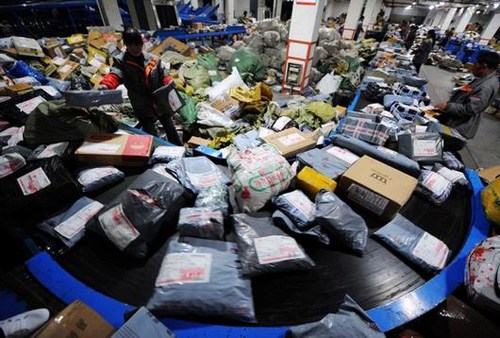
During the Spring Festival holiday, many express shipping companies shut up shop completely, while the few that elect to stay open either stop their pickup services or raise the related fee by a big margin.
(Ecns.cn)--As usual, express deliveries began to slow down days before the traditional Chinese New Year, which fell on January 23 this year and was followed by a seven-day holiday. The slowdown caused public anxiety and dissatisfaction as people were still engaged in buying gifts for their families.
Suspension of business during this period requires special approval by an administrative organ, yet many express shipping companies still shut up shop completely, while the few that elected to stay open either stopped their pickup services or raised the related fee by a big margin.
A delivery man from Shanghai-based Yunda Express revealed that their Shenzhen branch stopped trans-provincial deliveries on January 17. Similarly, Shanghai-based Shentong Express had been running a customer service hotline only.
Shunfeng Express, one of the leading domestic shippers, claimed to maintain full services during the holiday, yet the delivery time was stretched from a 48 hour window to 3-7 days, and charges were much higher than usual. A delivery man noticed that freight costs per order were 10 yuan higher than usual from January 22 to 28.
Reporters from the Southern Metropolis Weekly also found on January 18 that the majority of express companies in Guangdong 's capital of Guangzhou had stopped taking new orders, and informed customers they would resume operations starting January 30.
In this situation, customers may file complaints against said company, advised Liu Liangyi, director of the Express Management Division of the Department of Market Supervision & Inspection at the State Post Bureau. Statistics from the State Post Bureau show that from February 2 to 8, altogether 497 complaints were registered, and 90.5 percent of them were about express services, among which 87.1 percent, or 392, were about delayed deliveries.
"The data are a little old," pointed out Chen Liu, manager of a private express company. "China's express deliveries are advancing quite slowly, and still lag far behind the development of e-commerce. And that gap is widening year by year."
Investment company analyst Liang Shiyong commented that the fast-growing e-commerce sector has created an enormous market for express companies, yet the current courier operations are either too dependent on China's leading website for online shopping—Taobao.com—and similar platforms, or they suffer from various management deficits.
"Even if those companies can get a decent market share now, they still need to adopt a more intensive operation mode," said Liang.
"In America, the big four express companies account for 95 percent of market share, but the proportion enjoyed by their Chinese counterparts is only 50 percent of the domestic market. Obviously, an integration of resources will be needed in the coming five years, and only a few companies will likely survive," commented an investor called Zhan.
In June 2011, the State Post Bureau published the Opinions on M&A of Express Companies, which notes that the country plans to help cultivate several large, highly competitive express groups with annual revenues amounting to over 10 billion yuan (US$1.59 billion) over the next five years. "Merges and acquisitions had in fact already started before the Opinion was drafted," Xu Yong pointed out.
In an anticipatory move, Alibaba, a Chinese investment holding company which together with its subsidiaries is engaged in the provision of software, technology and other services on online B2B marketplaces, invested in 30 million yuan (US$ 4.76 million) in Xinchen Jibian Express as early as March 2010.
On December 31, 2011, on the brink of the annual festival, the China Express Association distributed Guidelines on Express Services During Spring Festival Holidays, which suggest that express companies should be open for at least six hours each day during the holiday period, and should not suspend business without the approval of authorities. However, the policy was defective in implementation.
Outlets are mostly run on a franchise basis, thus are relatively independent from their headquarters and remain responsible for their own profits and losses. The structure makes it rather daunting to unify operation hours, suggested an industry insider.
The manager of one express outlet indicated the human dimension of the problem, "Many delivery men are migrant workers desperate to return to their hometown for a family reunion; it's hard to keep them on duty during the Chinese New Year."
The China Express Consulting Website is the first to provide consulting services for the CEP (courier, express and postal industry) enterprises, and their chief consultant Xu Yong says that though measures have been taken to shake up express services, detailed regulations are still lacking.

Copyright ©1999-2011 Chinanews.com. All rights reserved.
Reproduction in whole or in part without permission is prohibited.